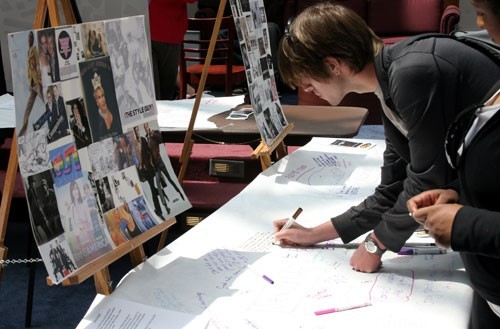
Diversity Education Program details results of workshop (Photo by Brittany Oswald, The Daily Campus)
Yesterday the Diversity Education Program facilitated a campus-wide workshop called “Picture Prejudice” in the Hughes-Trigg Commons.
The Diversity Education Program (DEP) is an initiative led by the Department of Multicultural Student Affairs to increase diversity education through student-led workshops. Every semester DEP offers a one-credit hour class where students become trained diversity facilitators.
This year’s class project was designed to provoke discussion about different “—isms.” —Isms derive from the misuse of power and result in biased thinking and acts of discrimination. Six posters were made to represent different categories in which people can be discriminated. By providing a collage of controversial visual images and asking students to anonymously and honestly write their responses; it is the hope of the DEP class to raise awareness about these issues and their effects on campus. By opening these issues for discussion, participants were able to share their thoughts and view the responses of others to gain a better understanding about the perspectives on campus.
There was a large turnout ranging from students to a broad spectrum of SMU staff, including police officers, professors and maintenance technicians, which provided a variety of opinions. The following are some comments representing the voices of the participants:
Sexuality
This category dealt with issues about sexual orientation, and it was here that some of the strongest opinions were expressed. The collage included pictures of the actors from “Will and Grace” kissing, the infamous Britney and Madonna kiss and a drag queen, among other photos.
One comment about homosexuality was, “Why would anyone choose to be a part of one of the most marginalized groups in the world? Why would anyone choose to be hated?” Some expressed opinions about the current marriage law debate, speaking for and against homosexual couples having the same rights as heterosexuals. Others were outwardly opposed to homosexuality, saying, “They are all going to hell!”
More tolerant views were “I admire those who aren’t afraid to be who they really are. In a world of fakes-being gay and proud and not hiding from the truth is admirable.”
Ableism
Ableism is a prejudice against people who mentally or physically do not meet society’s standards of “normal.” This encompasses issues surrounding size, age, mental capability and physical ability. Some participants expressed opinions derived from the pictures about how these persons are a “burden” and unfortunate, while others were more open-minded saying motivating comments like, “Where there is life, there is potential to achieve.”
Issues were stated about how SMU is not as accommodating to the needs of some of these persons. One person commented that a standard wheel chair doesn’t fit into the elevator in Dallas Hall, keeping people from taking classes or even seeing the seal. Even though SMU tries to make the campus better every year, some of the needs are not met.
Religion
Recent events ranging from 9/11 to the Danish cartoons have emphasized the importance and the necessity for religious tolerance. One participant wrote, “Religions destroy civilization, I prefer faith.” The poster displayed for this category included pictures representing most of the major world religions. The majority attitude was one of religious tolerance, but some expressed negative opinions about non-traditional religions saying, “All pagans will go to hell.” Others tried to mediate the written discussion by expressing thoughts like, “Quit worrying about answers, measure life in love and all will be fine.”
Sexism
Sexism is the exploitation of stereotypical gender roles in our society. This collage represented how women and men are viewed in the media. It also portrayed the gender roles in the workplace and in the home. Many discussed the pervasiveness of sex in our culture by stating how “sex is an action, not a tool for advertisement” and that “America as a society is oversexed and views women as objects.” One person shifted the blame from the media to the women, saying, “If women don’t want to be stereotyped as ‘sluts’ and ‘bitches’ then stop perpetuating the stereotype. Don’t call each other sluts, act slutty, or talk slutty and men will respect you!”
Classism
The classism poster represented biases based on social or economic standards. Some of the visuals contrasted high end lines such as Louis Vuitton and Tiffany & Co. with Payless and Wal-Mart. Classism affects consumption, which causes people to live lifestyles outside of their means. Many of the comments in response to the images pertained to “the superficiality of Greek life.” One person said, “Everyone tries to keep up with the Joneses, even though they can’t.” Unjustified stratification within society was cited as another important issue stemming from classism.
Racism
Racism is a discriminatory or abusive behavior toward members of another race. Racism insists that members of one race are superior to other races. Many of the images highlighted race conflicts in our history. Some of the comments concentrate on the cycle of racism, claiming that “it is taught everyday, blatantly and subtly as well.” In the United States racism is commonly depicted as the struggle between black and white.
However, it can be the result of any race that combines power plus prejudice such as the case with Nazi Germany. Racism is “deeply rooted” and some say that “it will always exist.”
Despite all of the hatred surrounding the discussion, one person acknowledged that “we are all the same gift; just our wrapping paper is different.”
Many comments written by participants indicated a lack of knowledge about diversity issues, and a hint of intolerance for people different from themselves. For instance, a DEP facilitator reported that an African-American student said, “I’m black and I am a racist.” This kind of comment proves the need on campus for a program like DEP that focuses on breaking down stereotypes. Two reasons for discriminatory acts are lack of understanding and fear of difference.
For students or organizations interested in becoming more informed about diversity, contact Fernando Salazar at [email protected] or 214-768-4580.











